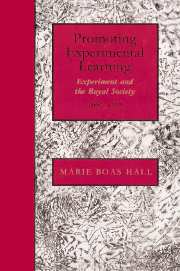Book contents
- Frontmatter
- Contents
- List of figures
- Preface
- A note on dates
- 1 Introductory
- 2 Aims and ideals
- 3 The record of the minutes 1660–1674
- 4 The communication of experiment 1660–1677
- 5 The record of the minutes 1674–1703
- 6 The communication of experiment 1677–1803
- 7 The record of the minutes 1703–1727
- 8 The communication of experiment 1703–1727
- 9 The view of the world; friend and foe
- Abbreviated titles
- Notes
- Bibliography
- Index
9 - The view of the world; friend and foe
Published online by Cambridge University Press: 03 December 2009
- Frontmatter
- Contents
- List of figures
- Preface
- A note on dates
- 1 Introductory
- 2 Aims and ideals
- 3 The record of the minutes 1660–1674
- 4 The communication of experiment 1660–1677
- 5 The record of the minutes 1674–1703
- 6 The communication of experiment 1677–1803
- 7 The record of the minutes 1703–1727
- 8 The communication of experiment 1703–1727
- 9 The view of the world; friend and foe
- Abbreviated titles
- Notes
- Bibliography
- Index
Summary
As should be all too obvious by now, the Fellows' view of the Society to which they were proud to belong was of an organisation which flourished in proportion as its meetings were devoted to experiment and empiricism. This they saw as their primary aim, this they endeavoured to put into practice, this they tried to promulgate and publicise, it was to this that they turned when the Society appeared to languish and need reform. They were perhaps almost too successful. For the fluctuating reputation of the Royal Society over the first seven decades of its existence was very largely in proportion to the quality of such work as perceived by the public: as performed and discussed at meetings, as reported in the Philosophical Transactions, and as revealed in the publications of individual Fellows. The intellectual world on the whole agreed with the Fellows that empiricism lay at the heart of the Society's activities, although not all agreed on the value of such work.
It is difficult to find impartial observers, necessarily outside those more or less closely in touch with the Society, not least because, in spite of occasional proposals to the contrary, in the seventeenth and eighteenth centuries the Royal Society was never an exclusive body, numbers were not limited and so those who sympathetically praised the Society were generally elected forthwith, whether active natural philosophers, virtuosi, physicians, natural historians, antiquaries or noblemen. Intellectuals not so honoured were apt to view the Society with disfavour, no doubt a prime reason for their not being elected.
- Type
- Chapter
- Information
- Promoting Experimental LearningExperiment and the Royal Society, 1660–1727, pp. 140 - 170Publisher: Cambridge University PressPrint publication year: 1991



